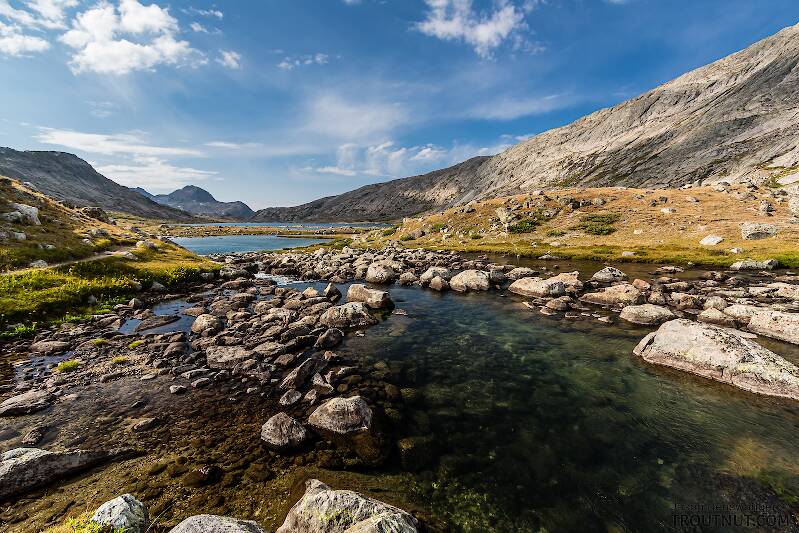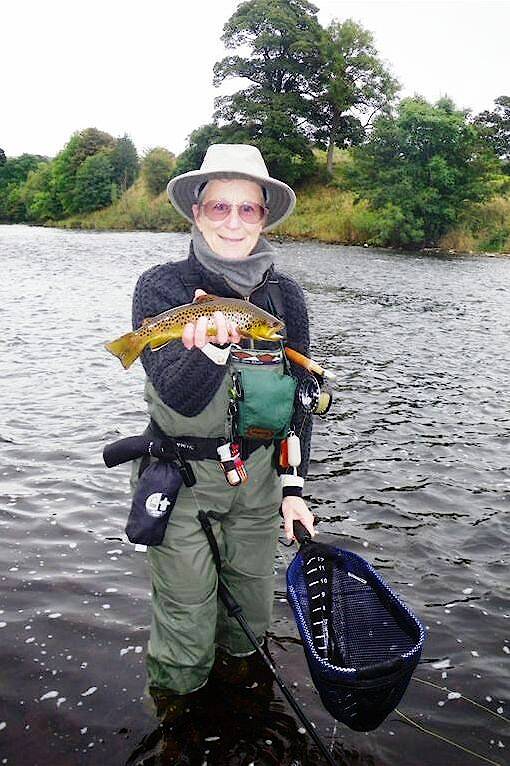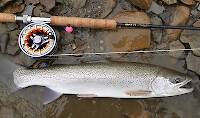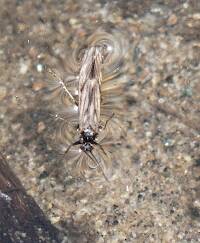
Hex Mayflies
Hexagenia limbata
The famous nocturnal Hex hatch of the Midwest (and a few other lucky locations) stirs to the surface mythically large brown trout that only touch streamers for the rest of the year.
Featured on the forum


Troutnut is a project started in 2003 by salmonid ecologist Jason "Troutnut" Neuswanger to help anglers and
fly tyers unabashedly embrace the entomological side of the sport. Learn more about Troutnut or
support the project for an enhanced experience here.
Shawnny3 on Oct 6, 2009October 6th, 2009, 5:32 am EDT
This was forwarded to me by a guy whose wife helped do this study. Thought you guys, especially those in PA, might want to read it:
http://www.post-gazette.com/pg/09277/1003007-113.stm#ixzz0SxqGesWH
-Shawn
http://www.post-gazette.com/pg/09277/1003007-113.stm#ixzz0SxqGesWH
-Shawn
Jewelry-Quality Artistic Salmon Flies, by Shawn Davis
www.davisflydesigns.com
www.davisflydesigns.com
GONZO on Oct 6, 2009October 6th, 2009, 4:39 pm EDT
Thanks, Shawn. The Marcellus Shale "gas rush" will be an environmental nightmare for PA, and I fear that we will be suffering the disasterous consequences for a long time to come. Of course, many private landowners are eager to lease their land in hard economic times, and they and the companies involved will make some money. Because I have been watching Ken Burns' outstanding series about our National Parks, I was reminded of John Muir's comment that "nothing dollarable is safe...."
JAD on Oct 7, 2009October 7th, 2009, 12:59 am EDT
Any chance for a link---I can't seem to do anything with the address above?
JAD
JAD
They fasten red (crimson red) wool around a hook, and fix onto the wool two feathers which grow under a cock’s wattles, and which in colour are like wax.
Radcliffe's Fishing from the Earliest Times,
CaseyP on Oct 7, 2009October 7th, 2009, 4:22 am EDT
The Marcellus Shale "gas rush" will be an environmental nightmare for PA, and I fear that we will be suffering the disasterous consequences for a long time to come.--Gonzo
nuts...just when the predictions of lower natural gas prices this winter made me feel better about our home's budget, the flip side arrives. where can we direct a personal effort?
"You can observe a lot by watching." Yogi Berra
SlateDrake9 on Oct 7, 2009October 7th, 2009, 4:58 am EDT
Fish while you can, fellas. I'm afraid that this is just the start of the end of trout fishing in a lot of our state. Here in N. Central PA they want to drill in just about every headwater we have. There have already been instances of dumping of "frack" water in the area. The state government wants to lease OUR state forest lands and state game lands for drilling to make money since they can't balance the budget.
Sad, sad days are coming that will make the acid mine drainage problems in parts of the state look like good waters to fish.
Sad, sad days are coming that will make the acid mine drainage problems in parts of the state look like good waters to fish.
Fishing with bait is like swearing in church.
-- Slate Drake
-- Slate Drake
GONZO on Oct 7, 2009October 7th, 2009, 6:34 am EDT
I agree with Slate Drake, and there is little or no hyperbole in his assessment. JAD, here is an active link: http://www.post-gazette.com/pg/09277/1003007-113.stm#ixzz0SxqGesWH
The Dunkard Creek incident may or may not be directly related to gas extraction operations, but the larger issues of illegal dumping and wholly inadequate enforcement of existing laws are certainly involved. And such unanticipated consequences are just the tiny tip of the iceberg when it comes to Marcellus Shale fracturing. For some (rather sterile) background, here is a link to the PATU paper on the subject:
http://www.patrout.org/PDFS/Marcellus_Final_21309.pdf
I would also recommend Ted Williams' article "Unnatural Gas" in the Oct./Nov. issue of Fly Rod & Reel for a more impassioned statement of the issues. To give a (foul) little taste of the corporate actors involved, I'll share a bit of that article for context:
Can Marcellus extraction be done without damaging the environment? Though some corporate shills (and politicans--same thing) will argue otherwise, the short answer is, by definition, "No." The damage will happen, though it could be mitigated by strong and vigilant enforcement of environmental laws. Will that vigilance and enforcement happen? Past history and the current economic climate also strongly suggest that the answer will be "No."
As Ted Williams points out, the only thing slowing the coming onslaught at the moment is, ironically, the recession. In the meantime, anyone who stands to make a buck from this will be pissing on our shoes while trying to convince us that it is raining. Business as usual.
Casey, I'd suggest directing concerns as close to the top of the sleazy pyramid of political power as possible. The PATU paper also lists contacts for reporting incidents. Although it is very important that we serve as "eyes" on the streams we love, that is usually after-the-fact action, and the enforcement organizations have little political power to affect the overall outcome. Because a large part of the problem is lax state enforcement of existing (especially federal) law driven by many years of weakened environmental regulation and "wink-and-nod" agreement that remaining laws will be overlooked, governors and congressmen are prime places to apply political pressure. Meanwhile, enjoy the recession while it lasts. It may be the only thing capable of holding the greedy dogs at bay.
The Dunkard Creek incident may or may not be directly related to gas extraction operations, but the larger issues of illegal dumping and wholly inadequate enforcement of existing laws are certainly involved. And such unanticipated consequences are just the tiny tip of the iceberg when it comes to Marcellus Shale fracturing. For some (rather sterile) background, here is a link to the PATU paper on the subject:
http://www.patrout.org/PDFS/Marcellus_Final_21309.pdf
I would also recommend Ted Williams' article "Unnatural Gas" in the Oct./Nov. issue of Fly Rod & Reel for a more impassioned statement of the issues. To give a (foul) little taste of the corporate actors involved, I'll share a bit of that article for context:
So-called clean natural gas fouls everything but your furnace. In a process called "hydraulic fracturing," developed by the Halliburton Company, a witches' brew of water, sand, formaldehyde, acids, petroleum compounds and herbicides (highly toxic to fish) that discourage pump-clogging algae in wastewater ponds and tanks, is blasted into the earth at high pressure, fracturing the shale. Dozens of other ingredients are unknown to the EPA and the public because the precise composition of "fracking fluid" is conveniently said by the industry to be a "trade secret."
Halliburton vows to pull its affected operations out of Colorado if the state forces it to disclose the recipe for its toxic cocktail. And the government accountability outfit OMB Watch reports that in 2008 a Colorado nurse almost died just by treating a gas field worker who had been doused in fracking fluid and that although the nurse was suffering heart, lung and liver failure, kidney damage and blurred vision, the drilling company refused to tell her doctors what the "proprietary" chemicals were.
Can Marcellus extraction be done without damaging the environment? Though some corporate shills (and politicans--same thing) will argue otherwise, the short answer is, by definition, "No." The damage will happen, though it could be mitigated by strong and vigilant enforcement of environmental laws. Will that vigilance and enforcement happen? Past history and the current economic climate also strongly suggest that the answer will be "No."
As Ted Williams points out, the only thing slowing the coming onslaught at the moment is, ironically, the recession. In the meantime, anyone who stands to make a buck from this will be pissing on our shoes while trying to convince us that it is raining. Business as usual.
where can we direct a personal effort?
Casey, I'd suggest directing concerns as close to the top of the sleazy pyramid of political power as possible. The PATU paper also lists contacts for reporting incidents. Although it is very important that we serve as "eyes" on the streams we love, that is usually after-the-fact action, and the enforcement organizations have little political power to affect the overall outcome. Because a large part of the problem is lax state enforcement of existing (especially federal) law driven by many years of weakened environmental regulation and "wink-and-nod" agreement that remaining laws will be overlooked, governors and congressmen are prime places to apply political pressure. Meanwhile, enjoy the recession while it lasts. It may be the only thing capable of holding the greedy dogs at bay.
Martinlf on Oct 7, 2009October 7th, 2009, 8:46 am EDT
I think John Dunn (JAD) first brought this to my attention. Bob Casey (D-PA) is the co-author of legislation that attempts to combat some of the negative effects of fracking:
http://www.allamericanpatriots.com/48753418-senator-bob-casey-on-protection-of-drinking-water-from-natural-gas-fracking
http://degette.house.gov/index.php?option=com_content&view=article&id=769:companion-bills-introduced-to-protect-drinking-water-from-natural-gas-fracking&catid=76:press-releases-&Itemid=227
There is, of course, massive opposition to the bill:
http://grassrootspa.com/2009/06/16/api-casey-backing-bill-to-kill-environmentally-safe-marcellus-shale-natural-gas-development/
http://www.energyindepth.org/2009/07/opposition-to-degette-casey-anit-fracking-bill-mounts/
Calls to congressmen and senators, as well as letters in local papers can help. If communities mobilize and start letter drives, petitions, etc. word will get out and some of the damage can be mitigated. Fracking is going to happen. The question is whether or not it will be regulated and controlled. There is some hope with Democrats in power, though no guarantee. Elected officials do listen to the voice of those who vote, though.
http://www.allamericanpatriots.com/48753418-senator-bob-casey-on-protection-of-drinking-water-from-natural-gas-fracking
http://degette.house.gov/index.php?option=com_content&view=article&id=769:companion-bills-introduced-to-protect-drinking-water-from-natural-gas-fracking&catid=76:press-releases-&Itemid=227
There is, of course, massive opposition to the bill:
http://grassrootspa.com/2009/06/16/api-casey-backing-bill-to-kill-environmentally-safe-marcellus-shale-natural-gas-development/
http://www.energyindepth.org/2009/07/opposition-to-degette-casey-anit-fracking-bill-mounts/
Calls to congressmen and senators, as well as letters in local papers can help. If communities mobilize and start letter drives, petitions, etc. word will get out and some of the damage can be mitigated. Fracking is going to happen. The question is whether or not it will be regulated and controlled. There is some hope with Democrats in power, though no guarantee. Elected officials do listen to the voice of those who vote, though.
"He spread them a yard and a half. 'And every one that got away is this big.'"
--Fred Chappell
--Fred Chappell
GONZO on Oct 7, 2009October 7th, 2009, 8:56 am EDT
Thanks, Louis. If you will place the letters url inside square brackets ahead of each web address and /url inside square brackets after each, it will make it easier for others to read those important items. (You can check to make sure that you have copied the url correctly by clicking on the link after it is active.)
JAD on Oct 7, 2009October 7th, 2009, 1:33 pm EDT
Their is quite a few Videos on U tube on this subject.
JAD
JAD
They fasten red (crimson red) wool around a hook, and fix onto the wool two feathers which grow under a cock’s wattles, and which in colour are like wax.
Radcliffe's Fishing from the Earliest Times,
Martinlf on Oct 7, 2009October 7th, 2009, 1:48 pm EDT
Thanks for the suggestion, Gonzo. I've done the more time consuming link process and was in a hurry, but it's easy to simply add the right code to activate the link. I'd forgotten how to do that.
"He spread them a yard and a half. 'And every one that got away is this big.'"
--Fred Chappell
--Fred Chappell
Quick Reply
Related Discussions
Topic
Replies
Last Reply
8
Mar 10, 2010
by Martinlf
by Martinlf
11
Aug 8, 2017
by CaseyP
by CaseyP
1
Jul 22, 2006
by Taxon
by Taxon











